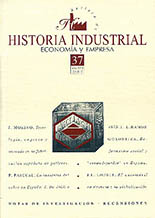Unrest against the industrial city: social reform and the “garden-city” in Spain, 1900-1923
Keywords:
Industrial City, Garden-City, Social Reform, SpainAbstract
Synthesizing very different intellectual sources -from Marshall and Spencer to Kropotkin and Bellamy-, E. Howard´s garden-city model was able to capture the interest in social reform which had arisen in Great Britain during the last decades of the nineteenth century, in relation to matters such as land reform, co-operativism or the reversal of migration flows from country to town. Moreover, his book Tomorrow: a Peaceful Path to Real Reform (1898) was the culmination of a long stream of criticism against the industrial city. It became widely known amongst different ideological positions and gave rise to an important international movement between 1900 and 1923. However, in Spain its influence was very limited during this period, despite the fact that there were several intellectual trends -such as krausism, catholic corporativism and georgism- which were concerned with social reform and were discontented with the new urban reality, sharing many of Howard´s insights. On the other hand, Cebrià de Montoliu´s attempt to spread the garden-city idea in Spain had to overcome the rivalry of Arturo Soria´s linear city.Downloads
Downloads
Published
How to Cite
Issue
Section
License
The author assigns all rights to the publisher. Creative Commons
The author who publishes in this journal agrees to the following terms:
- The author assigns all intellectual property rights exclusively to the publisher for the entire duration of the applicable intellectual property rights.
- The publisher will distribute the texts under the Creative Commons Attribution License, which allows others to share the work, provided that they acknowledge the authorship, its initial publication in this journal, and the conditions of the license.





